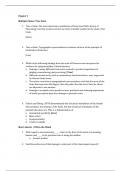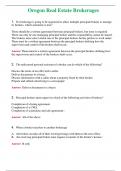Summary
Summary Outline And Evaluate The Effects Of Institutionalisation In Attachment Essay Plan
- Module
- Psychology
- Institution
- AQA
Essay Summary Plan for: Outline And Evaluate The Effects Of Institutionalisation In Attachment > Para One Ideas and Conclusion > Para Two Ideas and Conclusion > Para Three Ideas and Conclusion > 3-5 Limitations (In Red) and Positives (In Green) of the theory with supporting evid...
[Show more]












